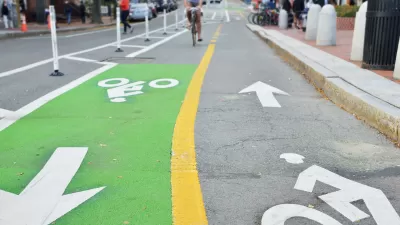Lee Epstein and Kaid Benfield pen a post on the importance of working rural landscapes to the sustainability agenda, which seems to be increasingly overlooked by smart growth advocates.
Although the authors acknowledge that recent attention has been paid to the, "strengthening of rural communities to make them more economically and environmentally resilient," they argue that what is missing from the sustainability and smart growth radar are the working landscapes in between rural towns.
By only focusing on the built-up rural areas, Epstein and Benfield note that planners and sustainability advocates miss the large swath of land under direct threat. "[T]he open, working lands around the town are often under direct threat or assault by the likes of debilitating and sprawling low density development even in the light of overall population loss (as in Pennsylvania), or by industries (such as mining or energy development) that sacrifice the long-term productive or natural character of a place even if they temporarily pump money into it."
The authors identify a number of proven and emerging strategies to prevent the loss of forest and farm land, but note that the development, coordination, and dispersal of such resources could be served by the involvement of governmental entities such as the innovative federal Partnership for Sustainable Communities.
"Their work would be strengthened by recognizing equally the importance of sustaining the working lands surrounding those communities that, if lost, will disconnect them from their heritage, culture, and in most places, a substantial portion of their economy."
FULL STORY: Let's link the working rural landscape to the sustainability agenda

Maui's Vacation Rental Debate Turns Ugly
Verbal attacks, misinformation campaigns and fistfights plague a high-stakes debate to convert thousands of vacation rentals into long-term housing.

Planetizen Federal Action Tracker
A weekly monitor of how Trump’s orders and actions are impacting planners and planning in America.

San Francisco Suspends Traffic Calming Amidst Record Deaths
Citing “a challenging fiscal landscape,” the city will cease the program on the heels of 42 traffic deaths, including 24 pedestrians.

Defunct Pittsburgh Power Plant to Become Residential Tower
A decommissioned steam heat plant will be redeveloped into almost 100 affordable housing units.

Trump Prompts Restructuring of Transportation Research Board in “Unprecedented Overreach”
The TRB has eliminated more than half of its committees including those focused on climate, equity, and cities.

Amtrak Rolls Out New Orleans to Alabama “Mardi Gras” Train
The new service will operate morning and evening departures between Mobile and New Orleans.
Urban Design for Planners 1: Software Tools
This six-course series explores essential urban design concepts using open source software and equips planners with the tools they need to participate fully in the urban design process.
Planning for Universal Design
Learn the tools for implementing Universal Design in planning regulations.
Heyer Gruel & Associates PA
JM Goldson LLC
Custer County Colorado
City of Camden Redevelopment Agency
City of Astoria
Transportation Research & Education Center (TREC) at Portland State University
Jefferson Parish Government
Camden Redevelopment Agency
City of Claremont



























